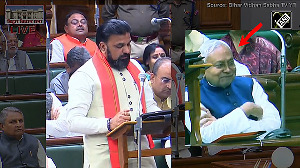 The Budget 2011 will have to synchronise the existing Income-tax Act with the proposed Direct Taxes Code. The Direct Taxes Code should take effect from Assessment Year 2012-13 (Financial Year 2011-12).
The Budget 2011 will have to synchronise the existing Income-tax Act with the proposed Direct Taxes Code. The Direct Taxes Code should take effect from Assessment Year 2012-13 (Financial Year 2011-12).Since the Budget 2011 will also affect the transactions of Finance Year 2011-12, a very careful synchronization of the Code with the Income-tax Act is necessary.
The Budget 2011 is naturally generating large expectations from the Government because of the unprecedented robust economy and record tax collections from direct and indirect taxes.
A few thoughts in this regard are discussed below.
Residential status of expatriate employees:
The taxability of an expatriate employee in India depends upon his residential status in India. If the expatriate is a resident and ordinarily resident then his global income would be liable to tax in India, otherwise, he is not liable to pay tax on his foreign income.
The law in regard to the residential status was amended by the Finance Act 2003 to the effect that the foreign employee can claim the status of "not ordinarily resident" for a maximum period of two years only, as against nine years earlier.
This will certainly discourage the expatriate employees to take up Indian assignments for a period of more than two years, which in-turn will adversely affect the industry or services where expatriates are engaged. It is therefore; strongly felt that the amendment made by the Finance Act 2003 should be withdrawn.
E-Filing of tax returns by foreign companies
CBDT has made commendable effort to devise suitable annexures for electronic filing. However, in practical parlance, the taxpayers usually face serious problems primarily because there is no space to give any further information which is considered relevant by an assessee to be filed along with the return. This difficulty is predominant in case of foreign companies.
The problem can surely be avoided if the format is re-devised.
Additional tax on Dividend payments
The levy of "additional income-tax", by way of "Dividend Distribution Tax" @ 15 per cent, directly hits a foreign investor because the said additional income-tax does not qualify for the underlying tax credit in the investor's home country.
It is, therefore, advisable that suitable amendments be made in income-tax law to ensure that non-resident shareholders become entitled to avail tax credit for the additional income-tax paid by the Indian domestic company.
Safe Harbour Rules to curb unreasonable high demands by TPOs
It has been felt that in the absence of "Safe Harbour Rules" and suitable instructions from the Board, TPOs are taking grossly unreasonable view while making transfer pricing assessments, like applying TP Provisions even on those transactions which do not affect the profit or loss of the assessee, such as increase in the Share Capital, temporary loans from a holding company to a subsidiary company etc.
Some TPOs are taking grossly arbitrary view on rate of interest on loans, rate of Bank Guarantee commission, rejecting the most appropriate method applied by the assessee for computation of ALP etc. DRP is hardly effective to curb the aforesaid harsh views.
The Government has publicly already authorized the Board to frame "Safe Harbour Rules" to avoid the assessee's problems, but nothing has been done so far. It is therefore, recommended that the Board should frame the "Safe Harbour Rules" without any further loss of time.
Amendment of tax treaties
India has signed large number of tax treaties with other countries. The treaties need a review from several angles like:
The author is a Senior Partner in S S Kothari Mehta & Co.
E-mail: hp.agrawal@sskmin.com










 © 2025
© 2025